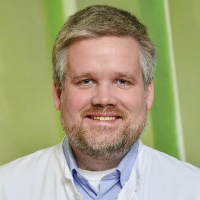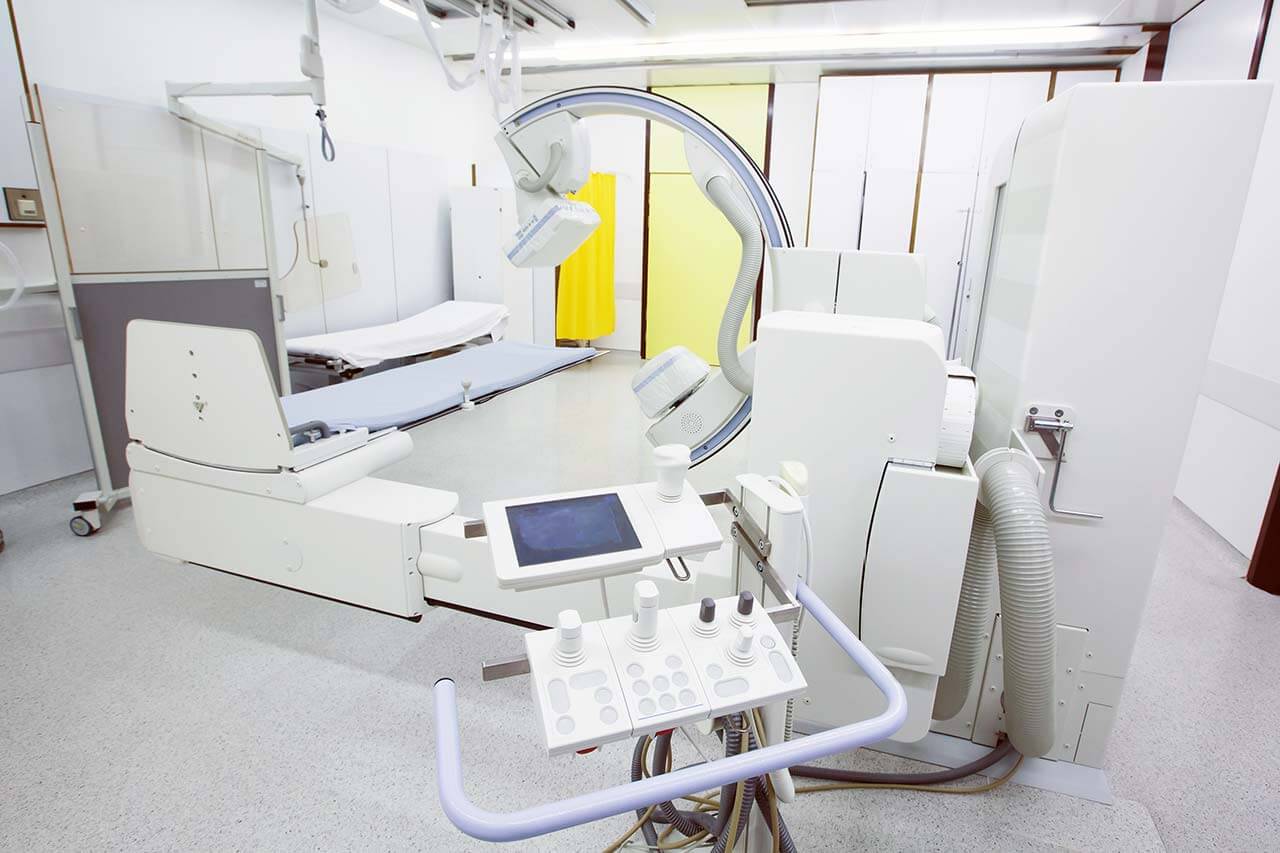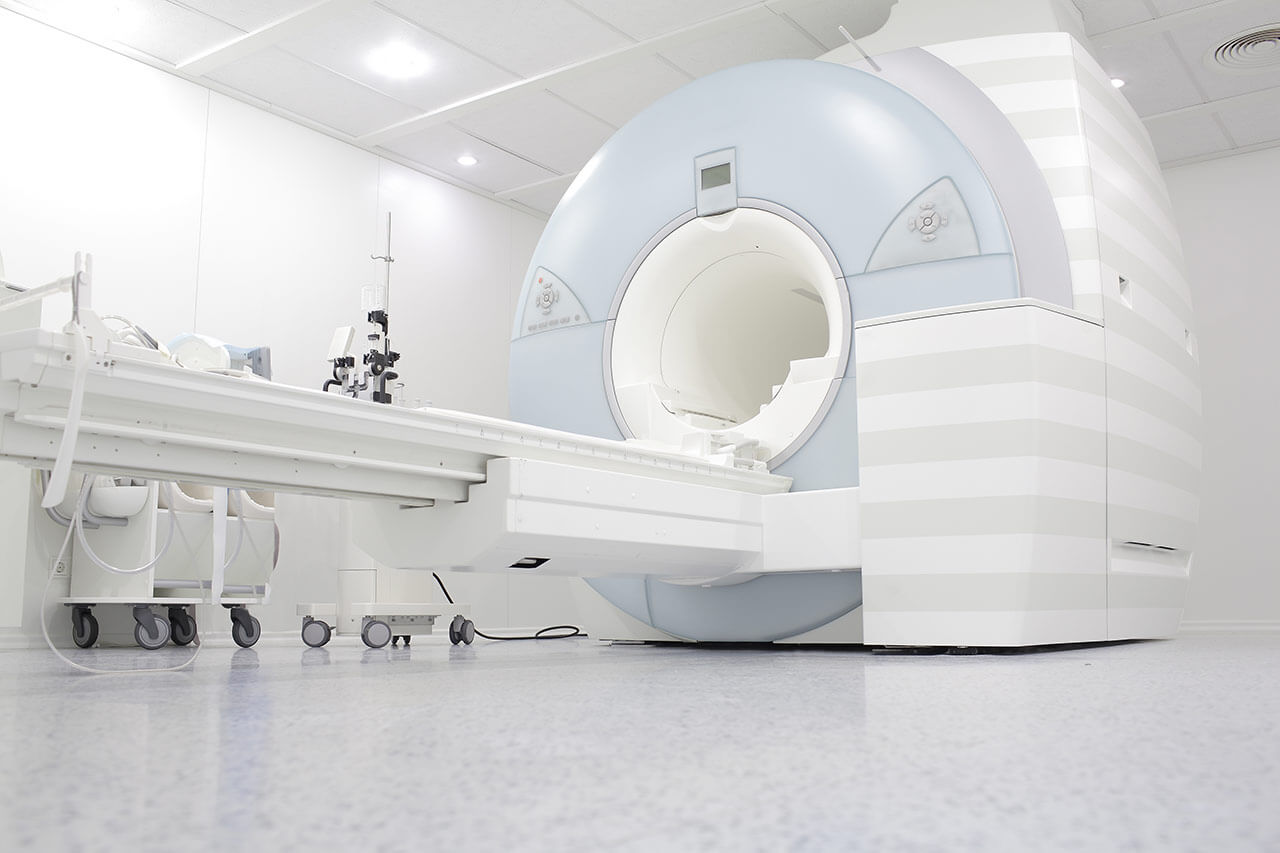
The program includes:
- Initial presentation in the clinic
- clinical history taking
- review of medical records
- physical examination
- laboratory tests:
- complete blood count
- biochemical analysis of blood
- inflammation indicators (CRP, ESR)
- TSH-basal, fT3, fT4
- indicators of blood coagulation
- CT planning of radiation therapy
- full course of conventional radiation therapy
- symptomatic treatment
- cost of essential medicines and materials
- nursing services
- control examinations
- consultations of related specialists
How program is carried out
During the first visit, the doctor will conduct a clinical examination and go through the results of previous laboratory tests and instrumental examinations. After that, you will undergo an additional examination, including complete blood count, laboratory assessment of liver and kidney function. Based on the received results, the physician will conduct radiotherapy planning with the help of CT or MRI, make the permanent tattoo marks on the skin and conduct CT simulation in order to assess the accuracy of the rays and the radiation dose. If necessary, related medical specialists will be involved in the elaboration of a treatment regimen (tumor board).
Radiation therapy is carried out as the day hospital procedure, without mandatory admission to the hospital. At each visit, the physician will assess your general condition and the marks on the skin. After that, you will be placed in a shielded radiation therapy room, on a special table.
Each radiation therapy session lasts less than half an hour (including preparation). All this time, doctors and nurses are monitoring your condition, you can communicate with them through a loudspeaker. The procedure is completely painless. Depending on the planned course of treatment, you will visit the hospital from 1 to 3-5 times a week.
After the completion of the radiation therapy course, you will undergo control examinations aimed at assessing your condition and efficacy of treatment. After that you will receive the medical report with detailed recommendations regarding further follow-up and treatment. In the future, you will be able to have a distant consultation with your attending physician and schedule the next course of treatment, if necessary.
Required documents
- Medical records
- MRI/CT scan (not older than 3 months)
- Biopsy results (if available)
Service
You may also book:
 BookingHealth Price from:
BookingHealth Price from:
About the department
The Department of Radiation Therapy at the Hannover Medical School provides the full range of medical services in its area of expertise and specializes in the treatment of oncological diseases using various forms of radiation. The department is the only medical center of this profile in the region. All types of radiation therapy are provided here, including electron and photon irradiation – 3D conformal radiation therapy, intensity-modulated radiation therapy, image-guided radiation therapy, stereotaxic radiation of the head and whole body, brachytherapy (also with IMRT and the possibility of the whole body radiation). Patients are treated by highly professional doctors with many years of clinical experience. The department is headed by Prof. Dr. med. Hans Christiansen.
Prior to prescribing a specific type of radiation therapy, the patient must undergo a complete diagnostic examination. Planning of the forthcoming irradiation is carried out using a Siemens SOMATOM Definition AS CT scanner. Radiation therapy sessions are carried out on advanced linear accelerators from Elekta, which provide the maximum therapeutic effect with the minimum radiation dose. In addition, the department has state-of-the-art equipment for afterloading radiation therapy. The advanced technologies at the disposal of the medical facility make it possible to focus the rays on the tumor as much as possible without damaging the neighboring healthy organs and tissues.
During the procedure, the patient receives a strictly defined dose of radiation, carefully calculated at the planning stage. The attending physician determines the duration of the course of treatment based on diagnostic data (diagnosis, tumor location, stage of cancer, general health condition of the patient, etc.). Stereotactic radiation therapy requires only one treatment session. After completing the full course of treatment, the patient receives the necessary recommendations for further observation. As a rule, three months after the radiation therapy, the patient undergoes a follow-up diagnostic examination to evaluate the results obtained.
The medical team of the department works closely with doctors of related specialties, including oncologists, chemotherapists, radiologists, as well as doctors specializing in gastroenterology, orthopedics, neurology, gynecology (depending on the type and location of the oncological process). An interdisciplinary approach allows achieving the best results in the fight against cancer.
The department specializes in the following types of radiation therapy:
- 3D conformal radiation therapy is a radiation method, the technology of which is based on voluminous planning. In other words, the shape of the radiated tissue volume is maximally approximated to the tumor form. Radiation therapists use images to identify target areas – tumors and surrounding healthy tissues, which should be either preserved or restored, if possible.
- Intensity modulated radiation therapy is the further development of 3D-conformal radiation. In addition to the direction of radiation and the shape of the radiation field, it is also possible to modulate the dose within the radiation field. This can be achieved by dividing the individual radiation fields into a large number of small "subfields" (the so-called subsegments). In certain clinical situations, the method makes it possible to even better protect the healthy tissue surrounding the tumor, as well as to increase the radiation dose in the tumor tissue in order to improve treatment effectiveness. One form of intensity-modulated radiation therapy is volumetric modulated arc therapy (VMAT). The planned volume of radiation is delivered very accurately, while the surrounding organs and tissues are optimally protected, as in IMRT. The accuracy of this radiation corresponds to the accuracy of IMRT. The duration of radiation can be reduced by rotating the irradiator around the patient.
- Image-guided radiation therapy (IGRT) is a method that involves creation of images at short intervals during a radiotherapy session. The images obtained by this type of therapy are compared by the radiotherapist with those taken at the planning stage. This improves the accuracy of the irradiation.
- Stereotactic radiation therapy allows destroying target areas of the tumor using high doses of radiation, which is comparable in efficiency to the result of surgery. The number of procedures and the dose of radiation depends on the type of tumor and its size. This method is often used to treat brain, lung, or liver tumors.
- Other types of radiation therapy
Curriculum vitae
- 1994 - 2001 Study of Medicine at the Georg August University Goettingen.
- 29.05.2001 Medical Exam.
- 06.25.2002 Doctor’s Degree. "DNA nucleotide sequence of hepatitis B virus in patients with seronegative hepatitis B when suspected of liver disease", Department of Medical Microbiology, Georg August University Goettingen, note: very good.
- 07.16.2007 Habilitation. "The effect of ionizing radiation on the liver: cellular, molecular-biological and genetic aspects".
Professional Career
- 01.08.2001 - 31.01.2003 Intern, Department of Radiation Therapy and Radiation Oncology, University Hospital Goettingen.
- 02.01.2003 Admission to medical practice.
- 01.02.2003 - 31.12.2011 Fellow of the Department of Radiation Therapy and Radiation Oncology, University Hospital Goettingen.
- 01.02.2003 - 19.10.2006 Assistant Physician, Department of Radiation Therapy and Radiation Oncology, University Hospital Goettingen.
- 19.10.2006 Board certification in radiotherapy, qualification in the field of teletherapy and brachytherapy.
- 06.03.2007 Recognized specialization "Planning of radiation therapy with the use of imaging methods".
- 01.08.2007 - 31.12.2011 Senior Physician of the Department of Radiation Therapy and Radiation Oncology, University Hospital Goettingen.
- 06.2010 - 12.2011 Visiting Professor at the University of Goettingen.
- 01.2011 Listed for W3 Professorship in Radiation Therapy, University of Muenster.
- 06.2011 Invitation to the position of W3 Professor in Radiation Therapy and Special Oncology at the Hannover Medical School.
- 01.2012 Chief Physician of the Department of Radiation Therapy at the Hannover Medical School.
Other Activities
- 1996 - 1997 Trainee in the Department of Histology, Anatomy Center.
- 01.1998 - 07.2001 Trainee in the Department of Virology.
- Since 2005 Reviewer of "Head and Neck".
- Since 2006 Reviewer of "Radiotherapy and Oncology" and "International Journal of Radiation Biology".
- Since 2007 Reviewer of "Radiation Oncology".
- Since 2008 Reviewer of "BMC Cancer", "Laboratory Research", "Radiation Investigation" and "International Journal of Radiation Oncology, Biology and Physics".
- Since 2009 Reviewer of "Wound Repair and Regeneration" and "Cancer".
- Since 2010 Reviewer of "Radiotherapy and Oncology".
- 22.11.2006 Appointed as a Radiation Protection Employee, University of Goettingen.
- 06.2011 Qualified Specialist in Blood Transfusion.
- Since 2007, Managing Director of the Committee of "Education of Medical Students", Society for Radiation Oncology (DEGRO).
- 11.2008 Deputy Director of the University Cancer Center.
- Since 2009 Managing Director of the DEGRO and BVDST Academy for Advanced Training in Radiation Therapy.
- 10.2009 Completed course "Palliative Medicine for Doctors" (basic course).
- 02.2010 Completed course "Medical Quality Management" (basic course).
- 03.2010 Completed supplementary course "Palliative Medicine for Doctors – Autumn Workshop Module 2".
- 12.2010 Completed advanced training course "Palliative Medicine for Doctors – Autumn Workshop Module 1".
- Since 2010, Member of the Scientific Advisory Board of "Radiotherapy and Oncology".
- 07.2011 Completed advanced training course "Palliative Medicine for Doctors – Autumn Workshop Module 1".
Scholarships and Awards for Research Papers
- 2004 Scholarship to support young scientists in the field of radiation oncology and radiation biology, 13th Symposium "Experimental Radiation Therapy and Clinical Radiation Biology", Dresden, March 2004.
- 2005 Varian Poster Award, 11th Annual Congress of the German Society of Radiation Oncology, Karlsruhe, May 2005.
- 2007 Varian Poster Award, 13th Annual Congress of the German Society of Radiation Oncology, Hannover, June 2007.
- 2008 Report Award, Annual Meeting of the German Association for Liver Study, Frankfurt, January 2008.
- 2008 Poster Award, 17th Symposium "Experimental Radiation Therapy and Clinical Radiation Biology", Dresden, March 2008.
- 2008 Holthusenpreis Award of the German Radiation Oncology Society (DEGRO), 14th Annual DEGRO Congress in Vienna, May 2008.
- 2008 Isodose Control Posterpreis, 11th Annual Meeting of the Society for Biological Radiation Research, Tubingen, October 2008.
- 2009 Varian Poster Award, 15th Congress of the German Society of Radiation Oncology (DEGRO), Bremen, June 2009.
- 2010 Elekta Poster Award, 16th Annual Congress of the German Society for Radiation Oncology (DEGRO), Magdeburg, June 2010.
Photo of the doctor: (c) Medizinische Hochschule Hannover (MHH)
About hospital
The Hannover Medical School has the status of a leading German medical facility. The advanced medical technologies, highly qualified specialists, as well as productive research activities form a solid basis for top-class medical service of the world standard. The hospital is proud of its outstanding achievements in the treatment of cancer, diseases of the lung, heart, kidney, liver and metabolic disorders, as well as surgical diseases.
The medical facility diagnoses and treats more than 63,000 inpatients and about 470,000 outpatients annally. These indicators are growing steadily, which indicates the reputability and prestige of the hospital in the European medical arena.
For decades, the hospital has been a pioneer in transplantation medicine and is one of the leading centers of this specialization in the world. It performs about 400 transplantations of solid organs annually. Also, the hospital has performed over 130 bone marrow transplantations. In addition, the hospital ranks among the world leaders in cochlear implantation for the treatment of hearing loss.
Much attention is paid to interdisciplinary cooperation. Since 2016, the hospital has the largest certified Cancer Center in the Federal State of Lower Saxony, which provides comprehensive, multidisciplinary medical care in accordance with the standardized protocols of cancer societies.
The specialists of the hospital offer patients not only modern treatment of the highest quality, but also attentive care, sympathetic attitude to the patient's problems and understanding of his individual needs. Thus, the patient can be sure that his health is in the safe hands of highly qualified doctors.
Photo: (c) depositphotos
Accommodation in hospital
Patients rooms
The patients of the Hannover Medical School live in comfortable and cozy rooms. Each patent room has an ensuite bathroom with shower and toilet. A standard patient room includes an automatically adjustable bed with an orthopedic mattress, a bedside table, a wardrobe, a TV and a telephone. You can use TV, telephone and Internet using a special chip card, which can be purchased at self-service terminals or ordered at the service counter. The hospital allows the patients to use mobile phones, with the exception of intensive care units, some departments and diagnostic rooms.
If desired, the patient can stay in an enhanced-comfort room. Such rooms are distinguished by a more sophisticated design, and are additionally equipped with upholstered furniture, a safe for storing valuables and a mini fridge.
Meals and Menus
The patient and the accompanying person are offered delicious and balanced three meals a day. Breakfast and dinner are served buffet style and lunch can be chosen from three set menus. All dishes are prepared by professional chefs using the freshest ingredients available in the region.
If you are on a specific diet for some reason, you will be offered an individual menu. Please inform the medical staff about your dietary preferences prior to the treatment.
Further details
Standard rooms include:
Religion
There is a chapel on the territory of the hospital, where Christian and Catholic services are regularly held. The hospital provides a prayer room for followers of Islam, which is open for visits 24 hours a day.
Religious services can also be provided upon request.
Accompanying person
During an inpatient program, an accompanying person can stay with you in the patient room or in a hotel of your choice.
Hotel
During an outpatient program, you can stay in a hotel of your choice. The managers will help you choose the most suitable options.




